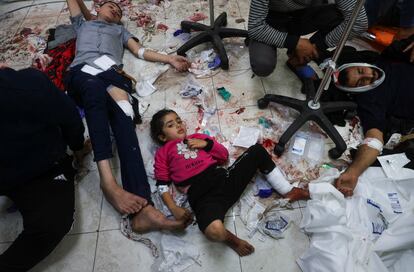UN warns of an ‘even more hellish scenario’ in Gaza as Israel pushes the population south
Israel continues to shell areas in southern Gaza, despite ordering internally displaced civilians to move there, as its troops continue their ground offensive


The United Nations is running out of words to describe the magnitude of the destruction and death in Gaza. The entity has gone from warning, in recent days, of the human “catastrophe” suffered by the 2.3 million people trapped inside Gaza, to ensuring on Tuesday that an “even more hellish scenario is about to unfold” in the Palestinian enclave, said Lynn Hastings, the U.N. humanitarian coordinator for the Palestinian territories. The alert comes after the Israeli army issued new orders for civilians to leave southern Gaza. A large portion of the 1.8 million internally displaced people are already crowded into an area of less than a third of the Gaza Strip — a zone of about 38 square smiles surrounding the city of Rafah —, according to the U.N. In Rafah, “there is no room in any school, hospital or building. People are sleeping in the streets,” Doaa Ulyan, a displaced Gazan, explained to this newspaper via WhatsApp.
On Tuesday, Avichay Adraee, an Arabic-language spokesman for the Israeli army, again urged the population in several areas of the city of Khan Younis, the second largest in the territory, to head towards the border area with Egypt. The day before, Israel had already ordered the eviction of several neighborhoods in that city, in the direction of Rafah, at the southern end of the coastal enclave. The U.N. has criticized these new evacuation orders, which it estimates will affect 600,000 people. Thomas White — the Gaza director of the United Nations Relief and Works Agency for Palestine Refugees in the Near East (UNRWA) — warned that an already crowded Rafah “will not cope with a doubling” of its population.
Despite urging Gazans to move to Rafah, last night Israel intensified its shelling in the area, according to Ulyan, 33, who sought refuge in the town in October along with her husband and two children, aged eight and 10. The family fled their home in Gaza City — destroyed a few days later — following an initial Israeli order, which instructed civilians in the north of the territory to move to the south. Monday night in Rafah “was terrifying, the [shelling] was constant,” the woman recounts.
“Many people from the north, from the west and from Khan Yunis are now crowded in Rafah,” Ulyan assures. “Can you imagine that a million people are now sheltering in this city?”
The new Israeli evacuation orders and the advancing ground offensive by its troops have also caused already overcrowded UNRWA shelters to become the most crammed they have been since the start of the war eight weeks ago, Philippe Lazzarini, the U.N. agency’s director, said Monday. At least 60,000 more people have tried seeking refuge at UNRWA centers. Many of them “have already been displaced several times” during this conflict, said the U.N. official. The Israeli offensive in Gaza has killed 15,900 people, almost half of whom are children, according to the latest figures released by the Ministry of Health of the Palestinian territory.
In Gaza, “the situation is getting worse by the hour,” Richard Peeperkorn, a World Health Organization (WHO) representative in the territory, stressed at a virtual press conference Tuesday. “There’s intensified bombing going on all around, including here in the southern areas, Khan Younis and even in Rafah,” the U.N. agency official denounced.
In the north, the Israeli army announced that it has completed its siege of the Jabaliya refugee camp, the largest in the Palestinian territory, which the military describes as “a Hamas stronghold.”
Ground offensive
In parallel to the increasingly intense airstrikes, Israel is continuing its ground offensive in the south. On Tuesday, Reuters quoted residents of Khan Younis as saying that Israeli tanks have entered the eastern neighborhoods of the city, after crossing the border fence with Gaza and heading west. Some troops have taken up positions in Beni Suhaila, on the eastern outskirts of the city. Others have taken up positions in Hamad City, a neighborhood of apartment blocks built by Qatar to rehouse destitute Palestinians who had lost their homes in the 2014 Israeli offensive. In recent days, Israeli planes have bombed this neighborhood, which now looks ghostly, according to images posted on social networks. Before the war, Khan Yunis had a population of approximately 200,000, which is estimated to have at least doubled by displaced persons arriving from the north following the first Israeli evacuation order in October.
From Rafah, Ulyan sends an audio message in which an intense buzzing sound can be heard. It is the sound of what Gazans call “zananah,” or drones. “These are different. They are armed,” the woman explains. “That sound accompanies us day and night,” she says.
Ulyan suffers from irritable bowel disease and is on medication that ran out three days ago. With the drones buzzing over the shelter where she lives, she cannot even try to go outside to find the medicines she depends on. The precariousness — which was already enormous before the new evacuation order — has been exacerbated by the arrival in Rafah of even more internally displaced people.
“We don’t have [drinking] water. We draw it from a well and boil it. We only eat beans and some rice distributed by the U.N., but there are so many people and the aid is insufficient. Israel only allows some aid to come in to [fool] the media, but that aid does not include anything the people need here. I am not exaggerating when I say that people are starving,” Ulyan says.
“We only eat once a day and a very small amount. Many times, I don’t eat [and instead] give it to my children. There is no food to buy anymore either,” she replies when asked if her family members, who reside in Spain, can help her financially. Money in Gaza is of little use anymore, she explains. “There is nothing left. There are no cleaning products, no toilet paper, no diapers,” she says. Ulyan has a valid visa to travel to Spain, but her children and husband do not. The Spanish Consulate in Jerusalem responded to her request for help to leave the Strip by indicating that it could only assist Spaniards.
What is happening in Gaza “is unprecedented,” Ulyan says. “What I’m telling you doesn’t convey even a fraction of the real suffering we’re going through.”
The president of the International Committee of the Red Cross, Mirjana Spoljaric, denounced the “intolerable” suffering of the Gazan population after visiting the territory on Monday. “What shocked me the most were the children with atrocious injuries and at the same time having lost their parents with no one looking out for them,” she said.
The leader of one of the mediators who sponsored the defunct truce between Israel and Hamas, Qatar, also referred to Gaza’s children on Tuesday. The emir of that Arab country, Tamim bin Hamad Al Thani, criticized the international community for “abandoning the children of Palestine” and called for an international investigation into Israel’s “brutal crimes” in the Strip, according to the Spanish news agency EFE.
Al Thani spoke from Doha at the opening of a summit of the Gulf Cooperation Council, an organization that also includes Saudi Arabia, Bahrain, Kuwait, Oman and the United Arab Emirates. Two of the main items on the agenda of this meeting are “stopping the war in Gaza” and restoring the truce, said Mohammed bin Abdulrahman bin Jassim Al Thani, Qatar’s prime minister.
Sign up for our weekly newsletter to get more English-language news coverage from EL PAÍS USA Edition
Tu suscripción se está usando en otro dispositivo
¿Quieres añadir otro usuario a tu suscripción?
Si continúas leyendo en este dispositivo, no se podrá leer en el otro.
FlechaTu suscripción se está usando en otro dispositivo y solo puedes acceder a EL PAÍS desde un dispositivo a la vez.
Si quieres compartir tu cuenta, cambia tu suscripción a la modalidad Premium, así podrás añadir otro usuario. Cada uno accederá con su propia cuenta de email, lo que os permitirá personalizar vuestra experiencia en EL PAÍS.
¿Tienes una suscripción de empresa? Accede aquí para contratar más cuentas.
En el caso de no saber quién está usando tu cuenta, te recomendamos cambiar tu contraseña aquí.
Si decides continuar compartiendo tu cuenta, este mensaje se mostrará en tu dispositivo y en el de la otra persona que está usando tu cuenta de forma indefinida, afectando a tu experiencia de lectura. Puedes consultar aquí los términos y condiciones de la suscripción digital.








































